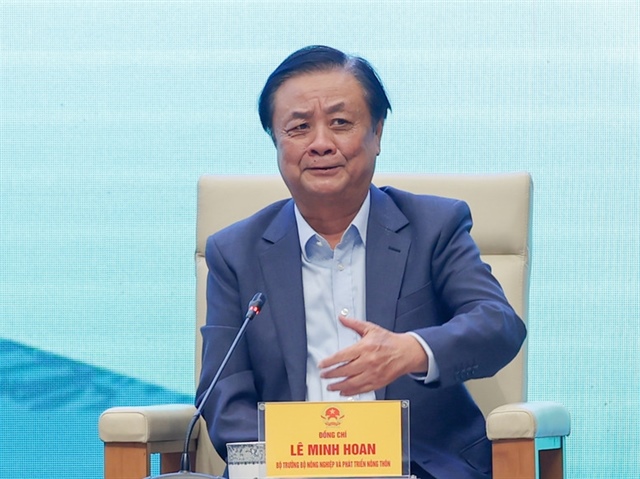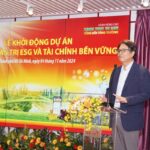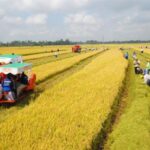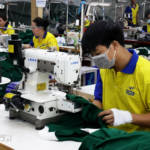According to a report by the Ministry of Agriculture and Rural Development, Vietnam exported approximately 9.18 million tons of rice in 2024, with an estimated turnover of 5.75 billion USD. Compared to the previous year, rice exports only increased by 12.9% in volume, but the value surged by 23%.
The country’s rice industry also set a historical record in terms of both output and value since 1989 (the first year Vietnam exported rice) up to now. Notably, Vietnam has become the first country in the world to produce high-quality and low-emission rice on a large scale of 1 million hectares.
At the conference “Prime Minister Dialogues with Vietnamese Farmers” in 2024, held on December 31st, Mr. Le Thanh Long from An Giang province raised questions regarding the government’s strategies to promote the carbon credit market and implement the project of 1 million hectares of high-yield and low-emission rice fields in the upcoming years.

Minister Le Minh Hoan shares the story of carbon credits in the project of 1 million hectares of high-quality rice and emission reduction in the Mekong Delta. Photo: VGP |
In response to the farmer’s inquiry, Minister of Agriculture and Rural Development, Le Minh Hoan, acknowledged the proactive participation of An Giang province in implementing the 1-million-hectare high-quality rice project. In pilot models, An Giang reported a 20-30% reduction in production costs, which translates to increased profits for farmers—a highly positive outcome.
Regarding carbon credits, the Prime Minister has directed the development of mechanisms and policies for this emerging market. However, Minister Hoan emphasized that the carbon credit market is novel, not just for Vietnam but globally. Therefore, relevant ministries are working together to propose a government-issued framework.
Additionally, he pointed out that instead of focusing on the monetary value of these credits, we should recognize the immense benefits that this initiative brings to Vietnamese agriculture, which are far more valuable.
For instance, straw can be utilized to create compressed pellets or field preparations for the next crop. The carbon credit scheme aims for a broader, more comprehensive goal than mere monetary gains. Minister Hoan shared this information to help farmers understand the true scope and significance of the carbon credit initiative.
Previously, Minister Le Minh Hoan acknowledged the positive impact of the 1-million-hectare high-yield rice project in the Mekong Delta on rice farmers. This project is considered a revolution in the development of the rice industry, making it stronger and wider, while also building the brand of Vietnamese low-emission rice globally.
The head of the agriculture sector also emphasized the goal of restructuring the rice industry towards sustainability, adaptability to climate change, and alignment with global green consumption trends.
He clarified that sustainable agricultural development should not solely focus on yield and output but also aim to reduce production costs, enhance rice quality and value, and ensure a healthy environment for farmers.
Therefore, the Minister requested that authorities, businesses, and cooperatives accompany and support farmers. Businesses, in particular, should commit to purchasing rice at prices higher than the market rate to encourage farmers to join cooperatives and boost cooperation and profitability. Authorities and party committees need to stand side by side with farmers, listen to their concerns, and promptly address their difficulties, thereby building trust and fostering a sense of community.
Tam An
– 15:18 31/12/2024
The Green Finance Framework: Pioneering Sustainability at HDBank
HDBank has unveiled its Sustainable Finance Framework, aligned with the standards set by the International Capital Market Association (ICMA) and the Loan Market Association (LMA). This framework was developed with technical support from the International Finance Corporation (IFC) and received a “very good” rating from Moody’s.
The Evolution of Vietnam’s Textile Industry: Navigating Challenges and Opportunities
The textile industry witnessed a remarkable recovery in 2024, paving the way for a confident and ambitious future. This resurgence lays the foundation for the sector to continue its strategic development, with a vision to thrive and excel in 2025 and beyond, marking a new era of prosperity and progress.





















